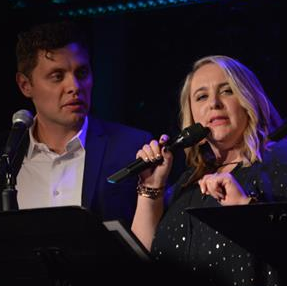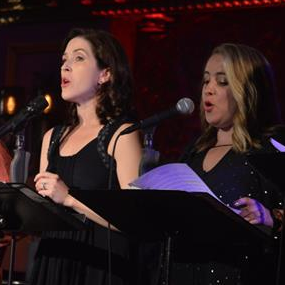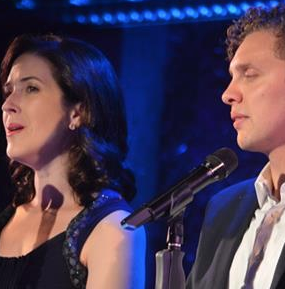by Alix Cohen
Tennessee Williams is a difficult subject. To simplify his life is a challenge in specificity and selection, to romanticize it a misnomer. This show’s creators appear to see the artist as a tragic figure, damaged by homosexuality, killed by success. Excessive alcohol, drugs, and the divided character that craved sensation and oblivion like mother’s milk takes a back seat. But then this is a musical whose authors are likely cognizant of the fact similar aspects killed Jerry Herman’s terrific Mack and Mabel.
We meet Williams as he’s released after a hospital stay. The protagonist tells us we’re to “glimpse behind the curtain, to see how I got to be such a battered old fool.” It’s kind of: This book report is about… followed by content. Joshua Morgan (Tennessee) has a fine accent. Characterization is focused and disturbed. His tenor effectively evokes tenderness and dissonance. First tunes are haunting, if familiar. Vocal arrangement lacks finesse.
Leah Horowitz plays Tennessee’s schizophrenic sister Rose before and after her lobotomy. Childhood fantasy games are without lyric originality. She pleads with him not to leave home. Tennessee can’t abide the confines of his upbringing, his violent, alcoholic father and drudge work at International Shoe Company factory ‐between schools‐ that caused a nervous breakdown at 24 (not mentioned.) He must find his way in the world.
Midway, hear Rose having lost her moorings with “Who Was I?” (She would not have cogently telephoned her brother before the operation.) Living in the past, she offers her beloved brother $10.00 to start him on his way. (Sections of the libretto are far better tha most lyrics.) At the end, she just stares into space. Horowitz has a simply gorgeous voice, pure and controlled. She’s sympathetic and compelling throughout, even in front of a music stand.
Mother Edwina’s disparagement of poetic pursuits emerges a shuffle‐along song. (Theresa McCarthy’s strong contralto.) His father’s disgust, “pansy” is rhymed with “nancy,” takes no account of Mr. Williams’ own problems and lifelong influence on the boy. (Lawrence Clayton’s deep, resonant baritone could be used to better purpose. The performer has chops.)
Arriving in New Orleans, we hear “The French Quarter Rag,” a brassy, hot mama number ably delivered by Megan Kane: We got something here for every taste/No matter what you feel below the waist/You can always say you came for the food…It’s one of the more successful efforts, rhythmic and insinuating.
Both Jelani Remy as ostensible first and rejected love‐“I don’t want to spend my life hiding”‐and Austin Colby as Tennessee’s longtime partner, Frank Merlo fare well with love songs.
Merlo is particularly poignant and affecting. “I wonder if anyone knows they’re happy when they’re happy.” The songs have lovely piano motifs, but… I may not be the kind of lover/You can take home to your mother … sounds like pastiche and …It’s the kind of love that cannot speak its name… is an unnecessary steal. “Not a Love Song,” however, performed by all the men, is wicked, sexual and quite good.
Theresa McCarthy also plays agent/confidante Audrey Wood with songs I see as ignored opportunities to sound like a pivotal figure in the author’s life, i.e. a distinct in tone and content. “Over and Done” is almost monotone. Songs by viscous critics (his latter life experience) miss the boat for the same reason. Clichés cascade and repeat ignoring a wealth of actual untapped quotes. Here, everyone singing at once becomes a cacophony.
Tennessee’s “I must say I’ve achieved a certain peace when all is said and done,” is patently impossible to believe. Musicalizing one of his plays might’ve reaped better rewards. Onstage talent, however, is very fine. As is Direction by James Will McBride.
Performed as part of Washington’s Arena Stage 2015 Kogod Cradle Series, A House of Glass makes its “NYC developmental debut” with this show.
Photos by Maryann Lopinto
A House of Glass: The Life of Tennessee Williams
Music‐Paul Levitt
Lyrics‐ Harriet McFaul Pilger & Shelly Herman Gillon
Directed by James Will McBride
Musical Direction/Piano – Alex LeFevre
Feinstein’s/54 Below 254 West 54th St. NYC
September 12, 2016





















